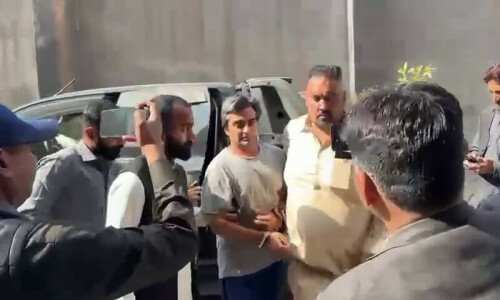LAHORE: The Punjab government is establishing an authority where it would place officials of different departments concerned to run an integrated traffic system initially in Lahore and later all over the province.
The scheme prepared by the Law and Order Wing of the Chief Minister’s Special Monitoring Unit was approved by Shahbaz Sharif here on Thursday.
The home minister, IGP, CCPO, Lahore commissioner, special assistant to chief minister Rana Maqbool, secretaries of the home, law, excise, local government, transport, LDA and PHA director generals, PITB chairman and SMU senior member Salman Sufi attended the meeting.
Currently, eight departments are tasked with management of roads and traffic and efficient management is impeded due to bureaucratic hurdles and lack of effective coordination. Furthermore, there is no mechanism to facilitate quick approval and implementation of traffic and road management plans by the government.
Challans, fine collection, driving licence, vehicle fitness certificate and registration under one roof
Official sources said the authority would resolve all these issues. It would have members from the home, transport and excise departments, traffic police, DCO, Traffic Engineering & Transport Planning Agency (TEPA) and Lahore Parking Company (LPC). The placement of all officials will be under one roof and this authority would handle traffic challaning, fine collection, NOC for new projects, issuance of driving licence, vehicle fitness certification, insurance certification and motor vehicle registration.
Sources said a study already conducted indicated improper engineering of roads and traffic violations. Some examples include lane violations, lack of effective structure for road crossing of pedestrians and non-functional traffic lights.
In the light of this study, the authorities were going to introduce a pilot motorcycle lane on Ferozpur Road. Zebra crossings too were being introduced throughout the province.
Traffic lights will be made operational round the clock through a hybrid of special and solar batteries.
Sources said on an average, around 1.8 million challans are sent to the courts every year with no effective recovery mechanism post court decisions. Other problems faced in Punjab include high violations escape rate, difficult evidence collection and manual traffic penalty ticket.
Under the plan, the database of excise and taxation would be integrated with the law-enforcement agencies helping them extract the information of the owner of the escaped vehicle through it. The traffic violation would be captured by the camera and fine challan would be sent to the owner’s house.
Currently, warning letters are being issued by the CTO (chief traffic officer) office, in collaboration with SMU, through handheld cameras. The traffic wardens are given these cameras and they take the picture of the violation (red light jumping, illegal parking etc), extract data of the owner from the excise department’s database and send warning letters to the owner’s houses.
As a next step, an amendment would be made in the law through which camera-integrated fines could be issued to the owner’s house. In the short run, these cameras would be outsourced to a third party for collecting data of violations and sending them to the CTO office electronically. The CTO office would send these violations to the owner’s houses.
Sources said the chief minister also approved 15 per cent of the revenue to be collected from camera-integrated fine to be given to traffic personnel and 25pc for equipment. Moreover, amount of fines for traffic violations would also be significantly increased in order to deter citizens from committing violations.
Citizens would be provided with a convenient method for payment of their fines. These methods include payments through ATMs, kiosks and online.
Fines would be attached to the number plate (its digital record) which would belong to the owner of the vehicle rather than the vehicle itself. And every resale of the vehicle would require issuance of a new number plate to the new owner and expunging of the old plate that belonged to the previous owner. The vehicle will be allowed to be sold only after payment of all fines imposed on it.
The Auto Number Plate Recognition (ANPR) cameras would through the licence plate, detect the vehicle owner violating traffic rules, and the fine would be sent to his or her house.
Published in Dawn, July 10th, 2015
On a mobile phone? Get the Dawn Mobile App: Apple Store | Google Play

















































